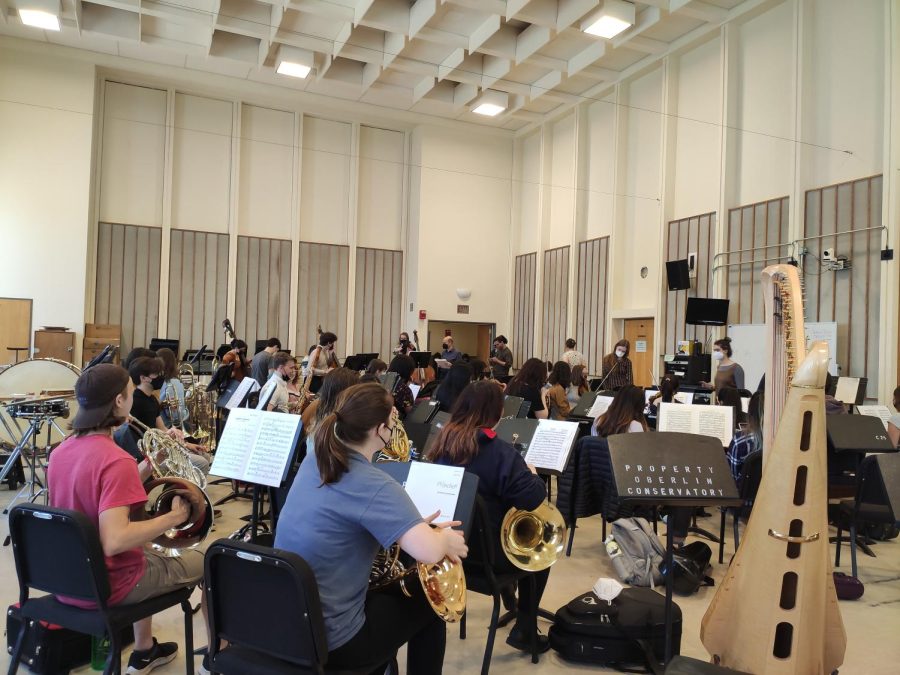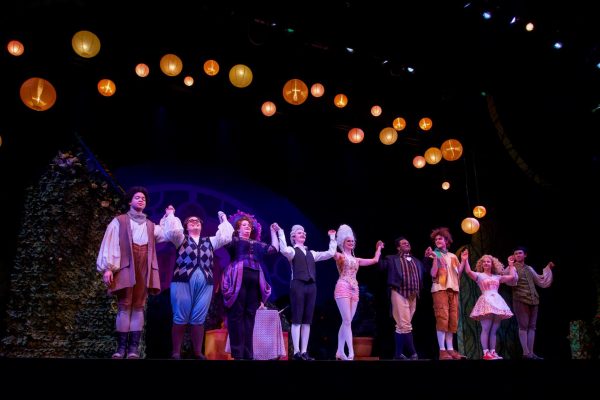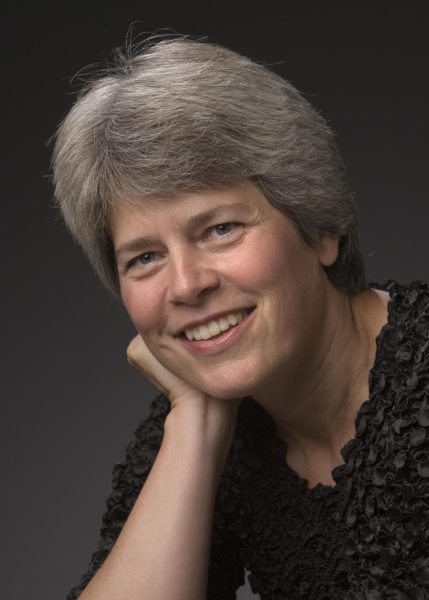Fridays at Finney Forays Into Unfamiliar
Oberlin Ensemble Rehearsing
The COVID-19 pandemic has created lasting changes in the structure of the Conservatory’s large ensemble program, which most instrumental performance majors must take for eight semesters to obtain their degree.
Starting in fall 2021, the four different groups making up the instrumental ensemble program — the Oberlin Orchestra and Chamber Orchestra, which are more traditionally focused, and the Contemporary Music Ensemble and the Sinfonietta, which are more new-music-focused — are now slated to help create a weekly concert program dubbed Fridays at Finney, which occurs most Fridays at 7:30 p.m. and consists of pieces performed by a mix of these ensembles.
While students only attend six hours of rehearsal time a week, they are asked to make nine hours available in their schedule in order to give Conductors Tim Weiss and Raphael Jiménez more scheduling flexibility. The ensemble manager posts the schedules on the weekend before the rehearsal week, and students are expected to adjust the week of.
This shorter adjustment period has proved difficult for some students because it limits their choices both in terms of course registration and availability for scheduling work shifts and other meetings and events — given that students do not know which hours of rehearsal they must attend until they receive the weekly schedule the weekend prior.
According to Raphael Jiménez, professor of Conducting and director of the Division of Conducting and Ensembles, the changes originated out of a necessity to conform to the restrictions brought upon by COVID-19 beginning in fall 2021.
“We found ourselves in a situation where we had to figure out how to provide training to 250-plus students under very restricted conditions,” Jiménez said. “This is a consequence of our COVID experience.”
Jiménez also emphasized that this new system did not mean students would have to put in more work, but that it was himself and Conductor Tim Weiss who would be directing the rehearsals for an additional three hours per week, giving them more chances to work with students in smaller, more intimate ensemble settings. Jiménez emphasized that this would accelerate students’ ability to rehearse efficiently and gain experience in a variety of settings.
“We decided to increase our availability to serve more people,” Jiménez said. “We ended up discovering that smaller ensemble experiences expedited the ensemble chops of the students. By rotating them between different kind of experiences, we’re giving them diversity of experience and diversity of repertoire as well.”
Jiménez added that the new Fridays at Finney concert system has provided a number of benefits to the community, including a more consistent concert schedule for concertgoers to follow.
“We have a concert every week, which for the community is great — people love it,” Jiménez said. “They know that on Fridays, they have something that they can count on.”
The transition to this new system has elicited a variety of reactions among students about how this impacts the preparedness of the ensembles.
“I think the quality of the concerts has gone down because of the shorter cycles,” said double-degree fourth-year bassoonist Abigail Heyrich. “The orchestra isn’t as comfortable with their parts or as an ensemble, especially in the two-week cycles. I think overall the Fridays at Finney concept is effective, but I think that there could be some weeks with no concerts to give ensembles more time to rehearse or to have sectionals more than maybe once.”
Heyrich added that the frequency of such concerts also means they lose some of the anticipation.
“It does feel like the excitement of orchestra concerts is kind of gone, though, since they’re happening so often,” Heyrich said.
Additionally, fourth-year double-degree cellist Sam Brinkley believes that in some ways Fridays at Finney has changed large ensemble for the better, but in other ways makes him feel less engaged with the program. He acknowledged how the fast-paced nature of the new system is designed to mimic the professional music world, but worries that it gives the ensemble performances a stifling mundanity.
“I think it’s harder to be engaged in the program if you’re moving so quickly between things, which I realize … within the world of professional orchestra playing is common, that you actually don’t have as much time to be sort of delving deep into a given set of repertoire,” Brinkley said. “Sometimes I think it’s made it feel like I’m less connected to the program; that it’s more just a time commitment that I’m required to invest in as a part of my degree.”
Students and community members hoping to attend Fridays at Finney concert can tune in April 29th for a performance of Prokofiev, Mozart, and Strauss.





